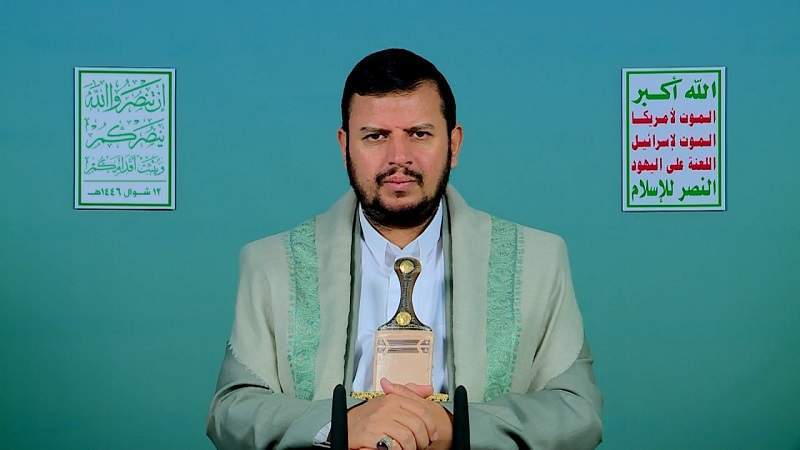Inspired by the Leader’s Speech: An Analysis of the Political, Mobilisation, and Religious Triptych

Yemen: In a historic speech delivered by the Leader of the Revolution Sayyed Abdulmalik Badr al-Din al-Houthi, Yemen’s unwavering stance—and that of the broader axis of resistance—was reaffirmed in confronting Israeli occupation and global Zionism. He held complicit Arab regimes accountable for their betrayal of the nation’s causes.
Sayyed Abdulmalik’s address on Thursday was far more than a political statement or a condemnation of aggression. It was a profound call to action—individual and collective, across all levels of society.
In this speech, the leader seamlessly unified the political, mobilization, and religious dimensions into a singular, cohesive vision for the struggle. It became not just a cause, but a sustained and transcendent mission—one that cuts across geography, politics, and sectarianism.
Religious Dimension
At the heart of the speech was its religious foundation—the pillar from which the call to jihad arose. Sayyed Abdulmalik repeatedly invoked Qur’anic concepts to make clear that supporting Palestine is not simply a political stance, but a religious obligation that every Muslim must uphold.
He presented this duty as religious, humanitarian, and political—giving it a universal appeal across all segments of the Ummah. The Palestinian cause stood as the focal point of his message, symbolizing an enduring injustice, a blatant aggression, and a long-standing struggle between truth and falsehood.
He underscored that jihad in the cause of Allah—especially at this critical moment—is the only viable path forward for the Islamic nation. Resisting the Israeli enemy, he emphasized, is a matter of faith, citing Qur’anic verses that call for resistance to tyranny and aggression. Failure to act, he warned, would amount to a betrayal of Allah and His Messenger.
This was a speech that merged religious duty with mass mobilization, reaffirming the centrality of Palestine and embedding it within a broader project to counter American and Zionist domination. It fused ideology with political consciousness, asserting that sustained popular action is the only path to meaningful progress in this confrontation.
Political Dimension
Politically, the leader conveyed a decisive message: Yemen is not a peripheral actor in the equation of deterrence—it is central to it, particularly in support of Gaza. He highlighted the cohesion and coordination of the resistance axis—from Yemen to Lebanon, Syria, Iraq, and Iran—against the American-Zionist agenda.
His words drew upon a unified Islamic consciousness, one that transcends sectarian divides and narrow national interests. He laid out a new framework for understanding the conflict, asserting that the Zionist war machine's assault on Gaza is not just a war on Palestine—it is a war on the entire Ummah.
He framed the Israeli enemy as the primary adversary of the Islamic nation—not just as an occupier of Palestine, but as a manifestation of a broader Zionist-American-Western project rooted in aggression and exploitation.
The leader drew a direct line between America’s unwavering support for the Zionist regime and the atrocities committed in Gaza, Yemen, Lebanon, Syria, and Iraq—reinforcing the notion of a “satanic alliance” bent on crushing free Arab and Muslim peoples.
He also exposed the international system’s complicity in occupation and genocide, declaring that international bodies—including the United Nations—have become tools of the aggressors, failing utterly in their mandate to protect the innocent.
Sayyed Abdulmalik called for widespread action on popular and diplomatic fronts, urging escalation of both military and political resistance. He also demanded the exposure and rejection of Arab regimes that have chosen the path of betrayal through normalization with the Zionist entity.
Mobilization Dimension
The Sayyed’s speech carried a deeply motivational and mobilizing tone—religious, revolutionary, and clear. It wove together the language of faith (satanic enemy, cancerous tumour, injustice, duty) with the language of political reality (military equations, alliances, battlefield dynamics).
It was a rallying cry to the Yemeni people and the free peoples of the Ummah. Beyond calls for participation in marches and events, the speech aimed to spark enduring enthusiasm and ensure ongoing mobilization—through media campaigns and a strong presence in all public arenas.
The speech clearly defined Yemen’s role in the broader Islamic struggle, asserting that the Yemeni people are not just supporters of the Palestinian cause, but central actors in the Al-Aqsa Flood battle and in resisting the genocide in Gaza.
He acknowledged the sacrifices of the Yemeni people, affirming that every step toward the liberation of Palestine is also a step toward freeing the entire Ummah from subjugation, humiliation, and defeatism.
Sayyed Abdulmalik renewed his call to all segments of the Islamic nation to take action—through media, grassroots activism, and economic resistance—especially through the “jihad of boycott.” This is not a time for passivity or silence, he said, but a time to stand firm against Zionist genocide and American-led aggression across the region.
His speech was a roadmap for comprehensive public mobilization and ongoing resistance—not only against Israeli occupation, but against all forces working to fragment and subjugate the Ummah.
What set the address apart was its clarity in defining enemies and allies—and its powerful ability to inspire ordinary people to see themselves as essential participants in a just and decisive battle. That is the speech’s enduring significance: its power to awaken awareness, shape convictions, and reframe the role each of us must play in the struggle for justice, dignity, and liberation.
Translated by Almasirah English website
#Yemen #Sayyed Abdulmalik Al-Houthi 25-04-11
-
03:26
Gaza Health Ministry: Toll of the Israeli aggression has risen to 53,486 martyrs and 121,398 wounded since the start of the aggression on Gaza.
03:26
Gaza Health Ministry: 136 martyrs and 364 wounded have arrived at hospitals in the past 24 hours.
03:25
Palestinian sources: 46 martyrs due to Israeli enemy strikes on Gaza since dawn today
12:53
Palestinian sources: 32 martyrs due to Israeli enemy strikes on Gaza since dawn today
10:33
Baghaei: We will respond to any hostile action; no ground for snapback mechanism to be triggered against Iran





